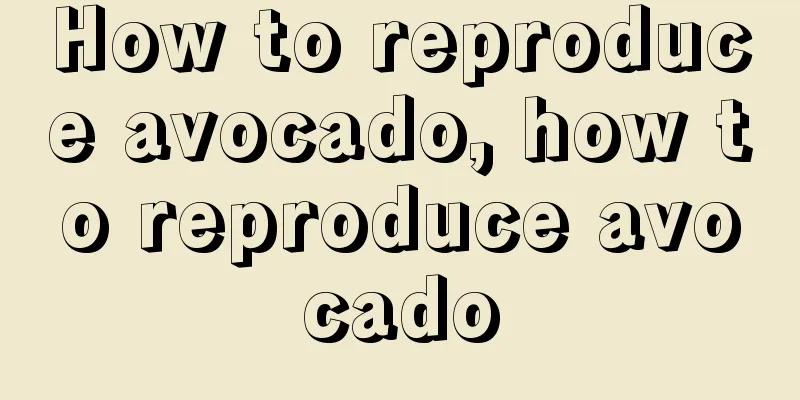How to reproduce avocado, how to reproduce avocado

1. Seed propagation1. Sowing time: Avocado is generally sown in spring, when the climate is relatively warm, which is very helpful for the seeds to take root and germinate. Because it is not heat-resistant and is afraid of cold, it is rarely planted in summer and winter. 2. How to germinate: Wash the avocado seeds, soak them in clean water for a day and night, take them out the next day, wrap them with wet paper towels and put them in a sealed box. Generally, the seeds will germinate after two to three weeks. 3. Sowing: Prepare loose and fertile sandy loam as a seedbed, bury the avocado seeds in it, cover it with soil, pour appropriate amount of water, and wait for it to grow into seedlings. 4. Seedling care: After planting, avocados need to be properly shaded to avoid exposure to sunlight. Water the plants every morning and evening to keep the soil moist. Wait until they germinate and expose them to light. Transplant them when they grow to 15-30 cm. 2. Grafting1. Rootstock selection: Mexican seedlings are usually used as rootstocks for avocado grafting. Compared with West Indian and Guatemalan varieties, Mexican varieties have stronger cold resistance, which is conducive to the growth and wintering of the plants. 2. Scion selection: Avocado scions are generally high-quality varieties from West India or Guatemala. Depending on the grafting method, there are also requirements for the age of the scion. For bud grafting, generally choose the middle branches of one year old, for cleft grafting, use 3-4 year old seedlings, and for approach grafting, use seedlings of half a year to one year old. 3. Grafting: If it is bud grafting, you need to cut off the part with the axillary buds, cut it into a shield shape, and insert it into the T-shaped cut of the rootstock. If it is a cleft graft, the bottom of the scion needs to be cut into a wedge shape, the rootstock needs to be split in the middle, and the scion needs to be inserted into it. Regardless of the grafting method, after the grafting is completed, it is necessary to wrap it tightly with plastic film to prevent moisture from entering. |
<<: High-yield cultivation technology of eggplant
>>: Cultivation techniques of azalea
Recommend
What kind of flowerpot is good for orchids?
What flowerpots look good with orchids? When plan...
Cultivation methods and precautions of Golden Vein Canna
1. Soil Fertile, organic-rich, deep sandy loam is...
Cultivation methods and precautions of creeping grass
1. Breeding methods 1. Soil: It is extremely resi...
Where are the best places to plant jujube trees?
Jujube tree planting conditions When the jujube t...
How to grow aloe vera quickly
1. Suitable soil Only when the plant grows in goo...
How to cultivate Daphne koreana
Growing conditions of Daphne koreana Osmanthus fr...
"Three-bath" cultivation method, give your orchid a bath
Orchid Bath Bathing means giving the orchid a bat...
Cultivation methods and precautions of black leaf Guanyin lotus
Black-leaf Alocasia is a relatively easy-to-grow ...
Can osmanthus trees be cultivated by cuttings?
1. Is it possible? Osmanthus trees have strong ad...
What should I do if the leaves of the weeping angel have become soft?
1. Reasonable exposure to light The weeping angel...
How to grow African jasmine in winter
Winter plant care mainly starts from the followin...
Cutting propagation method of Gloxinia
time The best time to propagate Gloxinia by cutti...
Does Snow Willow prefer shade or sun?
Does Snow Willow prefer shade or sun? Snow willow...
How to propagate roses with high survival rate? Rose propagation time and rapid rooting method
Roses are often propagated by cuttings, which has...
The difference between Zile and Gorgeous Windmill
1. Leaf Difference The leaves of Purple Music are...









